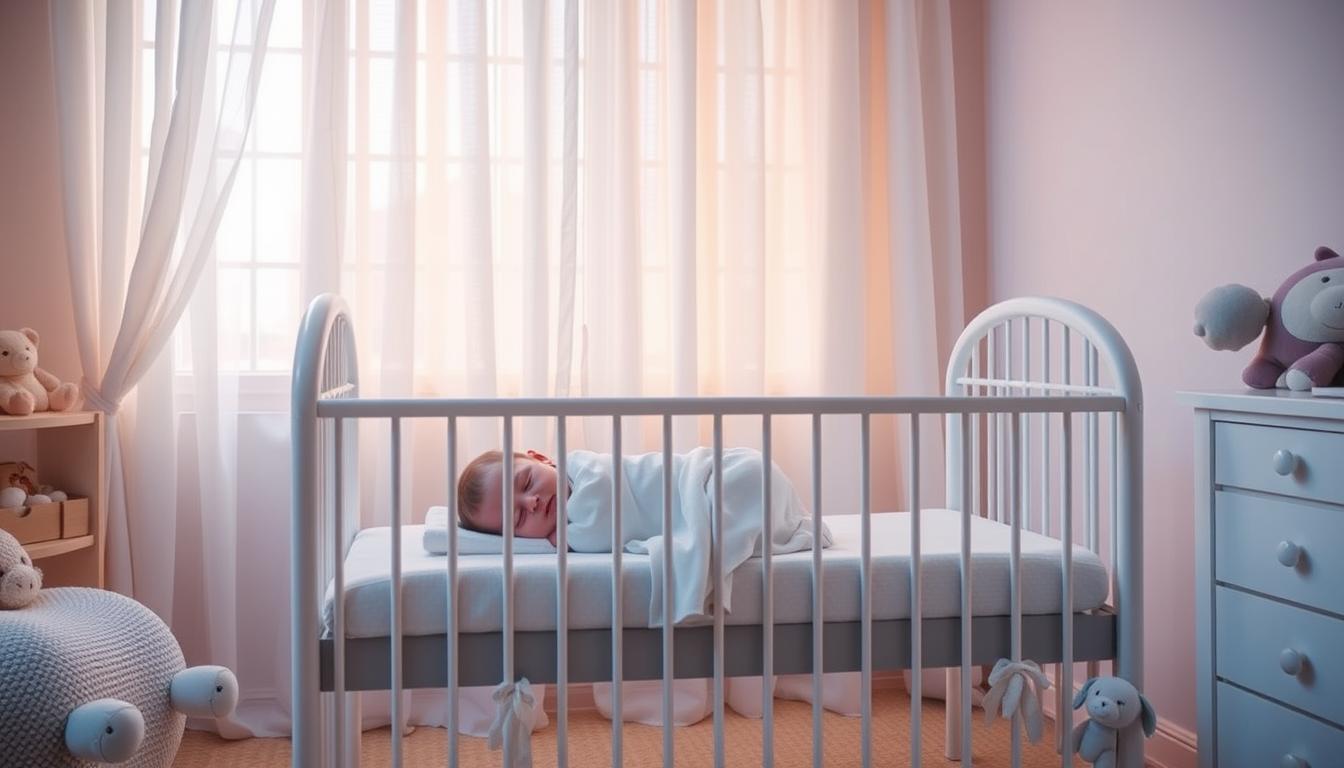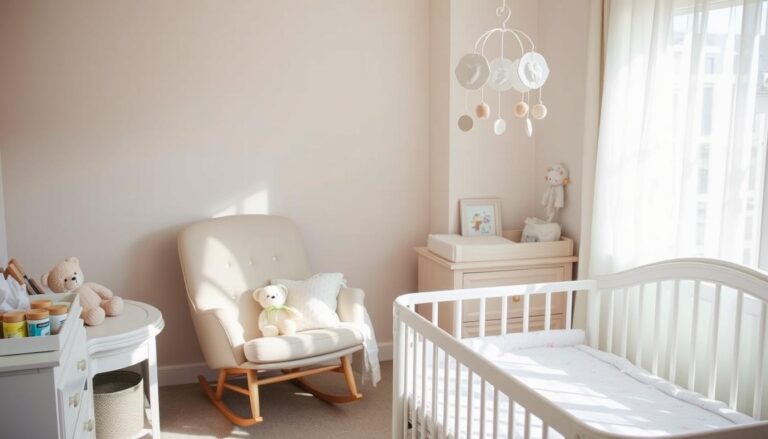Newborn Baby Sleep Secrets: Essential Tips for Restful Nights and Happy Days

Being a new parent can make you wonder about your baby’s sleep. But, with the right tips, you can help your baby sleep well. Finding calm moments is key in parenting, and a well-rested baby helps you too.
Table of Contents
Understanding Newborn Sleep Patterns
Newborns have two main sleep types: quiet and active sleep. Quiet sleep is when they are still and calm. Active sleep is when they move, make sounds, and even open their eyes, but they’re still asleep3. This phase is key for their brain and body development3.
Quiet Sleep vs. Active Sleep
Newborns sleep a lot, up to 14 to 17 hours in a day in the first three months3. They can only stay awake for 30 minutes at first, but this can grow to an hour by the end of the first month3. As they get older, they might sleep longer at night. But, they might still need to eat during the night until they are six months old or more3.
Signs of Sleepiness in Newborns
Knowing when your newborn is tired is important. Look for signs like yawning, eye rubbing, and staring3. They also might get fussy or have flushed eyebrows when they’re sleepy3.
Creating a safe sleep space and a bedtime routine helps your baby sleep well3. Every baby is different, so it might take time to find what works best for them4.
“Recognizing your newborn’s sleep cues can help you understand when they are ready for sleep.”
Safe Sleep for Newborns
It’s vital to ensure safe sleep practices for newborns to lower SIDS and sleep-related fatality risks. By sticking to these easy guidelines, you can create a safe and calm sleep space for your baby.
- Always place your baby on their back to sleep, on a firm, flat surface without any toys, stuffed animals, or bedding5.
- Room-sharing, where your baby sleeps in the same room as you for the first 6 months, is recommended as it can decrease the risk of SIDS by as much as 50% compared to bed-sharing5.
- Avoid co-sleeping, as it increases the odds of sleep-related suffocation by more than 18 times5.
- Steer clear of soft bedding, such as sheets, comforters, and blankets, as they can pose a 16 times higher risk of sleep-related suffocation5.
- Refrain from using weighted baby products, including sleepers, swaddles, and blankets, as they are considered unsafe for infants5.
Also, keep your baby’s sleeping area smoke-free and avoid overheating to lower SIDS risk6.
“Practicing safe sleep is one of the most important steps you can take to keep your newborn safe and healthy.”
By focusing on these safe sleep practices for newborns, you can give your baby a secure and cozy place to sleep. This helps prevent SIDS and promote a safe sleep environment6.
Newborn Baby Sleep: Tips for Better Nights
Ensuring your newborn baby gets enough sleep is vital for their growth and health. By following a few key tips, you can create a sleep-friendly environment. Let’s look at some strategies to help your newborn sleep better.
Swaddling for Soothing Sleep
Swaddling can greatly improve newborn sleep. Wrapping your baby snugly in a blanket helps prevent the startle reflex. It also keeps their arms in, leading to better sleep. Swaddling’s soothing effect is especially good for newborns, as it feels like being back in the womb.7
Optimal Sleep Environment
Creating the right sleep environment is crucial for newborns. Experts suggest keeping the room between 68°F and 72°F and using breathable fabrics. A dark, quiet space with white noise helps your baby sleep better.7 By reducing distractions, you can help your newborn sleep peacefully.
- Keep the room temperature between 68°F and 72°F.
- Dress your baby in breathable, comfortable clothing.
- Use white noise or a sound machine to create a soothing, consistent environment.
- Maintain a dark, quiet space to promote restful sleep.
Every newborn is different, so it might take some time to find the best sleep setup. But with patience and effort, you can create a sleep-friendly environment for your newborn.
“Establishing a consistent sleep routine and environment is key to helping newborns get the rest they need.”
Establishing a Bedtime Routine
Creating a consistent bedtime routine is key for healthy sleep habits in newborns. They usually need to go to bed between 9pm and 10pm. By 3 months, an even earlier bedtime is often needed8. Breastfed babies can sleep for 2.5-3 hours between feedings, while formula-fed ones can sleep for 3-4 hours8. A bedtime routine helps newborns sleep better, possibly avoiding the need for sleep training later8.
Babies from 0-4 months love predictability and routine for safety and security9. Studies show that babies and kids with a bedtime routine fall asleep faster, wake up less at night, and sleep better9. Most babies over 4 months sleep best between 7:00-8:00 pm9. A 30-60 minute bedtime window is perfect for flexibility9.
A typical bedtime routine for newborns includes a warm bath, massage, changing into pajamas, feeding, and cuddling. This routine helps their body and mind get ready for sleep. Starting a bedtime routine early or late is always a good idea for babies or toddlers9.
Newborns usually don’t have a set bedtime and often stay up past 8 PM10. Babies from 0-3 months sleep 14-17 hours, with a range of 11-19 hours10. Babies 4-11 months sleep 12-15 hours, with a range of 10-18 hours10.
By setting a consistent bedtime routine, you help your baby develop healthy sleep habits. Remember, every baby is unique. Be patient and flexible as you find the best routine for your family.
Importance of Daytime Naps
As a newborn parent, it’s key to make sure your little one naps regularly. Newborns usually wake up every 90 minutes to sleep11. By putting your baby down when they’re drowsy but awake, you help them learn to soothe themselves. This is the first step in building a good sleep routine11.
Daytime naps are vital for your baby’s sleep and growth. Research shows that napping kids do better in learning, memory, and thinking skills11. Babies under 5 months often take short naps, but as they get older, their naps get longer, closer to 5 months11.
Well-rested babies sleep better at night and nap better during the day11. Not getting enough daytime sleep can make babies overtired. This can make it harder for them to fall asleep at night and wake up more often11. To help your baby nap well, use soothing actions like feeding and rocking. Also, create a cozy sleep space to help them nap longer11.
Following the right wake windows can also improve your baby’s sleep11. Their nighttime sleep is linked to their daytime sleep11. So, it’s important to keep a consistent nap schedule for their health and growth.
| Age | Recommended Sleep in 24 Hours |
|---|---|
| 4–12 months | 12–16 hours |
| 1–2 years | 11–14 hours |
| 3–5 years | 10–13 hours |
The American Academy of Sleep Medicine (AASM) says babies usually take two to three naps a day. As they grow, they start taking only one nap12. Signs your baby needs a nap include closing their eyes, yawning, and pulling on their ears12.
The “2-3-4” nap schedule helps parents know when to expect naps. It means the first nap is two hours after waking, the second three hours after the first, and bedtime four hours after the second12. This schedule works best for babies 6 months and older. Dr. Lonzer advises against naps longer than two or three hours to keep night sleep good12.
By focusing on daytime naps and sticking to a routine, you ensure your baby gets the rest they need. This helps them thrive and brings peace to your family’s nights.
Encouraging Self-Soothing
Letting your newborn learn newborn self-soothing is very important. The “soothing ladder” technique is a great way to help them. It starts with simple things like shushing or patting, then moves to more hands-on methods if needed13.
Skin-to-skin contact is key for a baby’s self-regulation and independence13. But, parents might pick up their baby too fast, which can mess with their sleep13. Try pausing before you respond, and see if you can soothe them in their crib first. Repeat this as many times as it takes for them to learn13.
Teaching self-soothing takes time, consistency, and knowing when to step back13. Getting help from a coach can be very helpful. They can guide you through the process of teaching your baby to sleep13.
The Soothing Ladder Technique
The “soothing ladder” is a step-by-step way to help your newborn learn to self-soothe. It starts with the simplest methods and gets more involved if needed. This lets your baby learn this important skill over time13.
Patti Ideran, OTR/L, CEIM, is a pediatric occupational therapist with over 35 years of experience14. She specializes in helping infants and toddlers. Her knowledge in soothing techniques can be very helpful to parents14.
Dr. Mark Fishbein is a pediatric gastroenterologist at Ann and Robert H. Lurie Children’s Hospital of Chicago14. He has a lot of experience in pediatric feeding and swallowing disorders. His research can give parents more insight into how feeding and sleep are connected in newborns14.
Feeding and Sleeping
It’s key to help your newborn develop good eating and sleeping habits. If they fall asleep while eating, it might make it tough for them to sleep alone15. Start by moving feeding to an earlier part of the bedtime routine. Also, make sure they eat enough during the day to break this habit15.
Watch for your baby’s hunger signs and learn how to burp them well. This can help them sleep better16. Newborns often wake up to eat because of a hormone called cholecystokinin (CCK)16. Young babies have more of this hormone, making it harder to keep them awake16.
To help your baby sleep while feeding, try skin-to-skin contact and learning their early feeding cues16. You can also try breast compression, switching sides, and gentle stimulation like stroking16. Getting advice from healthcare professionals can also help with breastfeeding issues16.
By focusing on your baby’s eating and sleeping habits, you can set them up for success. Every baby is different, so be patient and flexible as you guide them through this journey.
| Newborn Sleep Guidelines | Recommended Range |
|---|---|
| Total Sleep in 24 Hours | 14-17 hours15 |
| Wake Windows | 35-90 minutes15 |
| Awake Time in 24 Hours | 6-10 hours15 |
| Nap Lengths | 20-120 minutes15 |
| Feeding Frequency | Every 2-3 hours15 |
| Feeding Duration | 30-40 minutes15 |
| Bedtime | 7:00-10:00 pm15 |
“Babies start to recognize routines as early as 8-12 weeks old, and beginning a bedtime routine early can set up for sleep success.”15
Newborn baby sleep: Timing is Key
As the sun sets, your newborn’s body starts to feel sleepy. This is because of a hormone called melatonin17. Try to put your baby to bed between 7 and 8 pm to catch this natural sleep signal17.
Watch for signs that your baby is tired, like becoming calm and less active. This will help you know when to start the bedtime routine17.
Newborns sleep a lot, needing 14-17 hours in a day17. Their sleep times can vary, from 35 to 90 minutes, based on their age17. Feeding them every 2-3 hours during the day helps keep their sleep schedule regular17.
Daytime naps for newborns can last from 20 to 120 minutes17. Starting a bedtime routine early, around 8-12 weeks, supports their sleep needs17.
Having a regular sleep schedule is very important18. Newborns sleep about 16 to 17 hours a day18. As they grow, their sleep patterns change with their development19.
By paying attention to your baby’s sleep cues, they can fall asleep faster and sleep longer19.
Focus on your newborn’s sleep needs and create a consistent bedtime routine. This is crucial for their optimal sleep and growth171819.
Consistency is Crucial
It’s very important to have a regular sleep routine for newborns. A predictable schedule helps their sleep and overall health20. If sleep routines change too much, babies might wake up at night. Keeping a steady routine is key for good baby sleep plans20.
By following the same bedtime routine every night, you help your baby learn to fall asleep on their own. This way, they can develop better sleep habits over time21.
Being consistent is the main secret to good newborn sleep20. Changing things up too much can mess with their sleep routine. Big changes like moving or getting sick can also disrupt their sleep20.
Young children get confused if things don’t stay the same. This can lead to more crying and make solving sleep problems harder20.
But, setting clear goals and a consistent sleep plan can help your baby sleep better20. A regular bedtime helps them adjust when their schedule changes. It also helps their body get into a rhythm for better sleep and waking up21.
Babies usually get sleepy between 7-8 pm, making it the best time for bed21. Newborns need 10-12 hours of sleep at night, so they need to go to bed early21. Studies show that a consistent bedtime routine can help babies sleep longer over time21.
Early bedtimes help babies sleep better and longer. They get less overtired and sleep more soundly at night21.
Creating a bedtime routine helps newborns know the difference between day and night. This improves their sleep patterns21. Starting a bedtime routine early is good for both the baby and the caregiver. It leads to longer sleep and a better sleep environment21.
Remember, being consistent is key for newborn sleep. A consistent routine helps your baby develop healthy sleep habits for the future2021.
Keeping a consistent bedtime routine is important. Also, make sure to feed your baby the same number of times each day22. Offer the dreamfeed between 10-11 pm for a consistent routine22. Babies under 6 months should eat for 30 minutes, including burping, and aim for bedtime within 30 minutes of the same time each night22.
Consistency is the foundation for successful newborn sleep. By establishing and maintaining a predictable routine, you can help your little one develop healthy sleep habits that will benefit them for years to come202122.
Prioritizing Your Mental Health
Being a new parent can be tough, especially with sleep deprivation. It’s key to focus on your mental health during this time23. Studies found that 93% of parents who tried sleep plans saw better sleep for their kids23. Also, 77.78% of those with depression, 88.89% with anxiety, and 87.5% with stress felt better23.
Starting a family can really affect your sleep. Moms lose about 62 minutes of sleep each night in the first three months. Dads lose 13 minutes24. This can lead to mental health issues like postpartum depression and anxiety24.
It’s good to talk to your partner, family, or professionals for support24. Having a strong support system can help fight mental health issues24. Yoga nidra can also help reduce stress and improve sleep24.
You’re not alone in this journey. Taking care of yourself and getting help can make a big difference. It helps you stay strong and focused on your mental health2324.

| Metric | Improvement |
|---|---|
| Improved child sleep | 93% |
| Moved to normal depression range | 77.78% |
| Moved to normal anxiety range | 88.89% |
| Moved to normal stress range | 87.5% |
By focusing on your mental health, you’ll be better for your newborn. Remember, taking care of yourself is not selfish. It’s crucial for your and your family’s well-being.
Conclusion
Creating healthy sleep habits for your newborn is a journey that requires patience. The tips in this article can guide you in setting up a calm bedtime routine. This supports your baby’s overall health25.
Newborns sleep in cycles of 50-60 minutes, with a mix of REM and non-REM sleep. They spend a lot of time in REM, which is crucial for brain growth26. They sleep about 20 hours a day, in short bursts because of their small stomachs. Their sleep is lighter and easier to disturb than adults’, due to more time in REM.
Every baby is different, so what works for one might not work for another. Be flexible and listen to your gut26. Keeping a consistent routine is essential for healthy sleep habits in newborns27. Knowing when your baby is alert can help you figure out when they need to sleep, eat, or feel comforted.
With consistency and taking care of yourself, you and your baby can get better sleep. This lays a solid foundation for lifelong healthy sleep habits.
The newborn sleep tips summary and healthy sleep habits for babies in this article are great for navigating early parenthood. They help ensure your baby gets enough rest to grow and flourish. By adapting these tips to your family’s needs, you can look forward to more peaceful nights and days filled with energy.
To read more about everything related to children, please click on the link
less
https://www.mommyandwomb.com/baby





